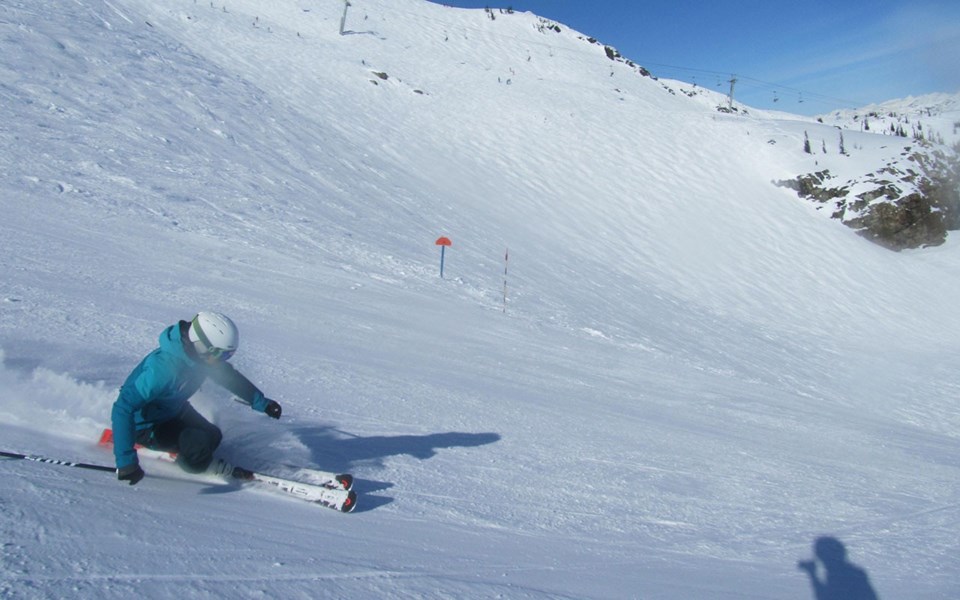On a bluebird day spring day, Tracey Fraser stands atop the Saddle, the iconic Whistler Mountain groomer that runs off the Peak Chair.
Lacking new snow, its rock hard—and steep—and most people slide-turn their way down, relieved to hit the bottom, where it mellows out.
Clad in her blue Whistler Blackcomb Snow School instructor's uniform, Fraser takes a different approach. Laying down a series of tight slalom turns, she carves her way down the face, leaving two deep tracks in her wake. "To be able to grip that snow, and have that momentum going with you—that's addictive," she later explains. "When we're doing it well, it feels amazing."
It's an impressive sight—but not entirely surprising—because Fraser is one of the top 10 ski instructors in the country. In March 2019, she will join nine other elite Canadian instructors—five from the East and five from the West—at the Interski Congress in Bulgaria. A meeting of the world's top ski professionals, the congresses will bring together national teams from 36 countries.
"Every ski instructor knows about Interski," explains Fraser, on the way up the Red Chair. "It's kind of like the Olympics of ski instructing."
For head coach Warren Jobbitt—who has attended three congresses, as both a coach and a demonstrator—the events, which take place every four years and began in 1951, are an opportunity to learn from the world's best.
Over a week, each team offers clinics and presentations. "Based on the content of the session, I'll send my team to gather information," explains Jobbitt. "And then on one of those days, we'll be one of the teams that's spreading the love."
Jobbitt says that every team stands out for something different, and that instructors bring back valuable knowledge that they in turn share with other Canadian instructors through workshops on Canadian soil.
The Austrians—where the industry is highly professionalized and most instructors come from a race background—are by far the most consistent. "If they bring 10 people, any one of them will have the same technique," he says.
The Swiss are highly athletic. "They don't all ski the same way—but they are world-class racers. You always see some pretty creative skiing from the Swiss."
The Canadian teams tend to stand out for their progressive pedagogical approach.
"We've really focused on how humans learn," says Jobbitt, who says the push started in the 1980s.
To be selected onto the Canadian team, you have to be a level-four ski instructor—and there are only around 200 active ones in Canada.
In Year 1, candidates are trained, and in Year 2, they demonstrate their skiing on various terrain. Skiing through set corridors of brushes, steep groomed runs black terrain and a bump run, they are assessed for both speed and technique by a panel of instructors.
"They have to be able to ski at a very high level of refinement and speed anywhere on the mountain—in any condition," says Jobbitt.
From there, the field is cut in half. In the third and final year, instructors are assessed on their teaching.
And that, explains Jobbitt, is where Fraser excels: "Her empathy for her students is incredible. People always comment on how nice Tracey was, how much she cared about their development and learning," says Jobbitt.
In preparation for the Congress, Fraser—who has a deep interest in how best to teach skiing to seniors (who are increasingly skiing at older ages)—will work on her presentation skills and technique.
"Every ski instructor you see out there is working on something, and it may be something they've worked on for 10 years," she explains.
"It may be to go faster, or go slower, or go in terrain you've never been able to go in before."
A member of Whistler Blackcomb's synchronized skiing team, she says she's most looking forward to the demonstration portion of the conference, when team's glide down a run in formations.
"I'm really looking forward to being part of those passes. It's hard but it's really fun," says Fraser.
Being in such elite company is a huge honour, she explains. "It's one of those ultimate moments. You don't just get here after a couple years. You work on it for years and years."
Fraser will be joined by another Whistler skier, Russ Wood, who will be attending his third Interski Congress. If you're looking for an impressive showcase of skiing's evolution, check out Intertski's website, which has video of the events through the ages: www.interski.org/en/history.




